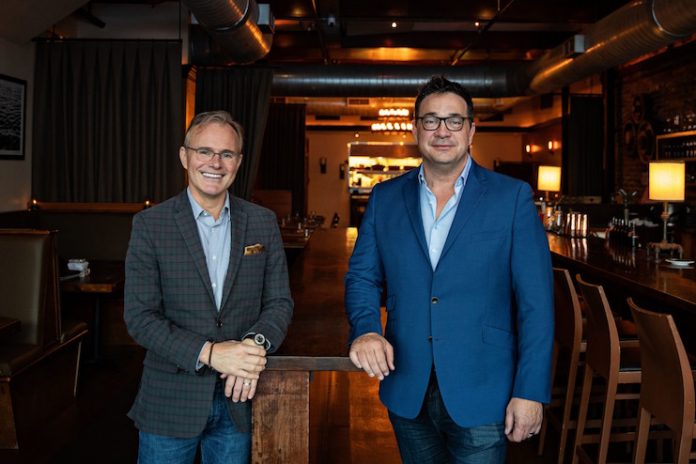At the recent Americas Lodging Investment Summit (ALIS), LODGING caught up with restauranteur Steve Palmer, the managing partner of the hospitality and consulting company The Indigo Road Hospitality Group, and his partner Larry Spelts, who is president of Indigo Road’s newly launched Lodging & Lifestyle Adventures Division. They described how their boutique hotel concept, which will be implemented at properties in Asheville, N.C., and Savannah, Ga., leverages their shared values and business goals, as well as their respective areas of expertise—Palmer’s in food and beverage and Spelts’ in lifestyle hotel development and management—to provide something the flags cannot.
What is the genesis of this partnership and venture?
Palmer: I started my restaurant company 10 years ago, and it was enormously successful. We grew from one to 24 restaurants in about eight years, but I had always dreamed of being in the hotel space—I even cut out a picture of the hotel in the movie Hotel Budapest when we were doing vision boards at a leadership meeting. I promised myself that when I was in my 50s, I’d do boutique hotels, so when I turned 50 in September, I flew to Dallas to meet with Larry, who I’d worked with 25 years ago on a hotel for which I created the restaurant, and convinced him to come onboard.
Spelts: It did come together quickly. We shook hands on it in October, began working in earnest in November, and deliberately announced it in the New Year to align with ALIS so we could gauge reaction and meet with interested people there.
What has been the response to your announcement at this meeting?
Spelts: There’s been so much interest, we haven’t had time to attend sessions. It’s just exceeded our expectations in how well it’s been received, which is just further indication that the time is right to provide an option for people who want to step back from the proliferation of ubiquitous flags.
Palmer: I think it demonstrates a real need, a craving in the boutique sector of our industry for a group with established expertise and success in food and beverage.
How important is food and beverage to hotel guests, and what are the trends in the hotel restaurant space?
Spelts: As we see it, really great food and beverage—the kind Steve offers in his restaurants—is essential to creating the experiences guests want. While hotels have traditionally offered restaurants as a service, not a profit center, a great restaurant—especially with a great environment, like a rooftop bar—can be quite profitable, especially when it attracts people in the community as well as hotel guests.
Palmer: We’re seeing a move away from regular breakfasts toward grab-and-go coffee bars, but with better quality pastries and healthier options, too, including juice bars. People want variety but they also want healthy, especially if they’re traveling for business.
How and why should a hotel reach out to the community?
Palmer: Apart from the obvious—more sales—local business establishes hotel food and beverage as being more than just convenient. It’s a choice. I know if I lived in the neighborhood, I would go to the phenomenal juice bar they have at the Virgin Hotel in San Francisco every day.
Spelts: As we see it, the secret of success in food and beverage at a hotel is making sure it appeals to the locals. If they come, so will the guests. Nothing makes visitors to a city—especially boutique hotel guests seeking authentic experiences—feel more like they’re in a legit, local place than if it’s filled by locals.
What can you tell us about the hotels that will come of this venture?
Palmer: We haven’t yet gone through branding and naming, but I can mention the first two. One is an adaptive reuse project in Ashville, N.C. It will have 71 rooms, a stunning rooftop bar, restaurant, and a speakeasy in the basement. The one in Savannah, Ga., will be mix of adaptive reuse and ground-up construction.
What’s unique about what we’re doing with our hotels is that we are operating the food and beverage ourselves and we have the ability to do it really well.
Spelts: These are both great markets for lifestyle, experience-driven boutique hotels. These hotels exhibit the alchemy—that just-right concept that appeals to visitors and locals—that aligns with the passion Steve and I have for creating authentic hospitality experiences either through food and beverage or lodging.
Do you any specific portfolio goals?
Palmer: We’re taking it as it comes. I chuckle now about how my restaurant company grew. I never worked for a large restaurant group or intended to have one, but our growth came about mainly because I wanted to create more opportunities for our people. Larry and are aligned in that we want to do things we’re excited and passionate about. The best hotel restaurants were nearly always operated by third parties. What’s unique about what we’re doing with our hotels is that we are operating the food and beverage ourselves and we have the ability to do it really well.
Spelts: We really are like unicorns. For these two properties, we’re working with like-minded people from the interior design industry. We don’t have the pressure to return a profit on a timetable. If you take a short view and know you’re going to be exiting from an asset in five years, it’s going to inform your choices. We and our partners may be here doing this for 20 years at this location, so we want to make we do it right. That said, we’ll only grow to the extent we can find like-minded partners.











